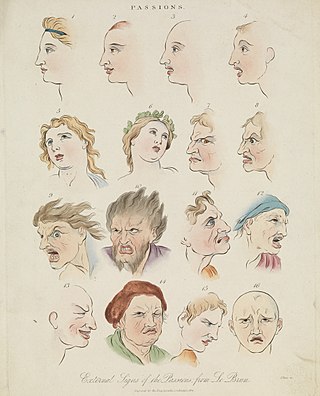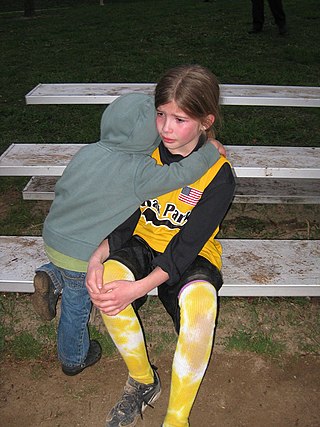
Emotions are mental states brought on by neurophysiological changes, variously associated with thoughts, feelings, behavioral responses, and a degree of pleasure or displeasure. There is no scientific consensus on a definition. Emotions are often intertwined with mood, temperament, personality, disposition, or creativity.

Cognitive neuroscience is the scientific field that is concerned with the study of the biological processes and aspects that underlie cognition, with a specific focus on the neural connections in the brain which are involved in mental processes. It addresses the questions of how cognitive activities are affected or controlled by neural circuits in the brain. Cognitive neuroscience is a branch of both neuroscience and psychology, overlapping with disciplines such as behavioral neuroscience, cognitive psychology, physiological psychology and affective neuroscience. Cognitive neuroscience relies upon theories in cognitive science coupled with evidence from neurobiology, and computational modeling.
The following outline is provided as an overview of and topical guide to neuroscience:

Empathy is generally described as the ability to take on another's perspective, to understand, feel and possibly share and respond to their experience. There are more definitions of empathy that include but is not limited to social, cognitive, and emotional processes primarily concerned with understanding others. Often times, empathy is considered to be a broad term, and broken down into more specific concepts and types that include cognitive empathy, emotional empathy, somatic empathy, and spiritual empathy.
Social cognition is a topic within psychology that focuses on how people process, store, and apply information about other people and social situations. It focuses on the role that cognitive processes play in social interactions.
Social neuroscience is an interdisciplinary field devoted to understanding the relationship between social experiences and biological systems. Humans are fundamentally a social species, rather than solitary. As such, Homo sapiens create emergent organizations beyond the individual—structures that range from dyads, families, and groups to cities, civilizations, and cultures. In this regard, studies indicate that various social influences, including life events, poverty, unemployment and loneliness can influence health related biomarkers. The term "social neuroscience" can be traced to a publication entitled "Social Neuroscience Bulletin" which was published quarterly between 1988 and 1994. The term was subsequently popularized in an article by John Cacioppo and Gary Berntson, published in the American Psychologist in 1992. Cacioppo and Berntson are considered as the legitimate fathers of social neuroscience. Still a young field, social neuroscience is closely related to personality neuroscience, affective neuroscience and cognitive neuroscience, focusing on how the brain mediates social interactions. The biological underpinnings of social cognition are investigated in social cognitive neuroscience.
Music psychology, or the psychology of music, may be regarded as a branch of both psychology and musicology. It aims to explain and understand musical behaviour and experience, including the processes through which music is perceived, created, responded to, and incorporated into everyday life. Modern music psychology is primarily empirical; its knowledge tends to advance on the basis of interpretations of data collected by systematic observation of and interaction with human participants. Music psychology is a field of research with practical relevance for many areas, including music performance, composition, education, criticism, and therapy, as well as investigations of human attitude, skill, performance, intelligence, creativity, and social behavior.
Jerome Kagan was an American psychologist, who was the Daniel and Amy Starch Research Professor of Psychology at Harvard University, as well as, co-faculty at the New England Complex Systems Institute. He was one of the key pioneers of developmental psychology.

Jean Decety is an American–French neuroscientist specializing in developmental neuroscience, affective neuroscience, and social neuroscience. His research focuses on the psychological and neurobiological mechanisms underpinning social cognition, particularly social decision-making, empathy, moral reasoning, altruism, pro-social behavior, and more generally interpersonal relationships. He is Irving B. Harris Distinguished Service Professor at the University of Chicago.
Hot cognition is a hypothesis on motivated reasoning in which a person's thinking is influenced by their emotional state. Put simply, hot cognition is cognition coloured by emotion. Hot cognition contrasts with cold cognition, which implies cognitive processing of information that is independent of emotional involvement. Hot cognition is proposed to be associated with cognitive and physiological arousal, in which a person is more responsive to environmental factors. As it is automatic, rapid and led by emotion, hot cognition may consequently cause biased decision making. Hot cognition may arise, with varying degrees of strength, in politics, religion, and other sociopolitical contexts because of moral issues, which are inevitably tied to emotion. Hot cognition was initially proposed in 1963 by Robert P. Abelson. The idea became popular in the 1960s and the 1970s.
Some of the research that is conducted in the field of psychology is more "fundamental" than the research conducted in the applied psychological disciplines, and does not necessarily have a direct application. The subdisciplines within psychology that can be thought to reflect a basic-science orientation include biological psychology, cognitive psychology, neuropsychology, and so on. Research in these subdisciplines is characterized by methodological rigor. The concern of psychology as a basic science is in understanding the laws and processes that underlie behavior, cognition, and emotion. Psychology as a basic science provides a foundation for applied psychology. Applied psychology, by contrast, involves the application of psychological principles and theories yielded up by the basic psychological sciences; these applications are aimed at overcoming problems or promoting well-being in areas such as mental and physical health and education.
Neuroscientists have learned much about the role of the brain in numerous cognitive mechanisms by understanding corresponding disorders. Similarly, neuroscientists have come to learn much about music cognition by studying music-specific disorders. Even though music is most often viewed from a "historical perspective rather than a biological one" music has significantly gained the attention of neuroscientists all around the world. For many centuries music has been strongly associated with art and culture. The reason for this increased interest in music is because it "provides a tool to study numerous aspects of neuroscience, from motor skill learning to emotion".
Educational neuroscience is an emerging scientific field that brings together researchers in cognitive neuroscience, developmental cognitive neuroscience, educational psychology, educational technology, education theory and other related disciplines to explore the interactions between biological processes and education. Researchers in educational neuroscience investigate the neural mechanisms of reading, numerical cognition, attention and their attendant difficulties including dyslexia, dyscalculia and ADHD as they relate to education. Researchers in this area may link basic findings in cognitive neuroscience with educational technology to help in curriculum implementation for mathematics education and reading education. The aim of educational neuroscience is to generate basic and applied research that will provide a new transdisciplinary account of learning and teaching, which is capable of informing education. A major goal of educational neuroscience is to bridge the gap between the two fields through a direct dialogue between researchers and educators, avoiding the "middlemen of the brain-based learning industry". These middlemen have a vested commercial interest in the selling of "neuromyths" and their supposed remedies.
Philip David Zelazo is a developmental psychologist and neuroscientist. His research has helped shape the field of developmental cognitive neuroscience regarding the development of executive function.
Clinical neuroscience is a branch of neuroscience that focuses on the scientific study of fundamental mechanisms that underlie diseases and disorders of the brain and central nervous system. It seeks to develop new ways of conceptualizing and diagnosing such disorders and ultimately of developing novel treatments.
Claus Lamm is a Professor of Biological Psychology and the head of the Social, Cognitive and Affective Neuroscience Unit at the Faculty of Psychology of the University of Vienna. His research focuses on the psychological and biological mechanisms underlying social cognition, affect, and behavior. His main research interest are the neural underpinnings of empathy, to whose understanding he has made pioneering contributions.
Emotional intelligence (EI) involves using cognitive and emotional abilities to function in interpersonal relationships, social groups as well as manage one's emotional states. It consists of abilities such as social cognition, empathy and also reasoning about the emotions of others.
Lucina Q. Uddin is an American cognitive neuroscientist who is a professor at the University of California, Los Angeles. Her research investigates the relationship between brain connectivity and cognition in typical and atypical development using network neuroscience approaches.

Antoine Bechara is an American neuroscientist, academic and researcher. He is currently a professor of Psychology and Neuroscience at the University of Southern California.




